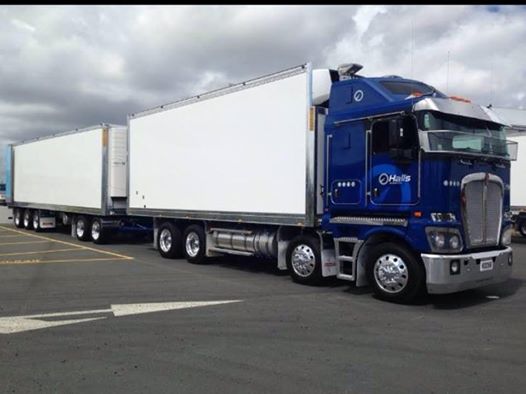What Are The Blood Preasure Requirements To Pass A DOT Physical
Topic 1935 | Page 1

Just curious what are the blood preasure requirements for passing a dot physical. I have slight high blood preasure and did not think of this till now. So does anyone know for sure how that work for the physical? thanks Ron
From the PDF Medical Report form I downloaded off the federal FMCSA/DOT website, "Driver qualified if <140/90" is under the boxes for the dyastolic/systolic results.
In the comments at the bottom:
§391.41 PHYSICAL QUALIFICATIONS FOR DRIVERS (a) A person shall not drive a commercial motor vehicle unless he is physically qualified to do so and, except as provided in §391.67, has on his person the original, or a photographic copy, of a medical examiner's certificate that he is physically qualified to drive a commercial motor vehicle. (b) A person is physically qualified to drive a motor vehicle if that person: (1) Has no loss of a foot, a leg, a hand, or an arm, or has been granted a Skill Performance Evaluation (SPE) Certificate (formerly Limb Waiver Program) pursuant to §391.49. (2) Has no impairment of: (i) A hand or finger which interferes with prehension or power grasping; or (ii) An arm, foot, or leg which interferes with the ability to perform normal tasks associated with operating a commercial motor vehicle; or any other significant limb defect or limitation which interferes with the ability to perform normal tasks associated with operating a commercial motor vehicle; or has been granted a SPE Certificate pursuant to §391.49. (3) Has no established medical history or clinical diagnosis of diabetes mellitus currently requiring insulin for control; (4) Has no current clinical diagnosis of myocardial infarction, angina pectoris, coronary insufficiency, thrombosis, or any other cardiovascular disease of a variety known to be accompanied by syncope, dyspnea, collapse, or congestive cardiac failure. (5) Has no established medical history or clinical diagnosis of a respiratory dysfunction likely to interfere with his ability to control and drive a commercial motor vehicle safely. (6) Has no current clinical diagnosis of high blood pressure likely to interfere with his ability to operate a commercial motor vehicle safely. (7) Has no established medical history or clinical diagnosis of rheumatic, arthritic, orthopedic, muscular, neuromuscular, or vascular disease which interferes with his ability to control and operate a commercial motor vehicle safely. (8) Has no established medical history or clinical diagnosis of epilepsy or any other condition which is likely to cause loss of consciousness or any loss of ability to control a commercial motor vehicle; (9) Has no mental, nervous, organic, or functional disease or psychiatric disorder likely to interfere with his ability to drive a commercial motor vehicle safely; (10) Has distant visual acuity of at least 20/40 (Snellen) in each eye without corrective lenses or visual acuity separately corrected to 20/40 (Snellen) or better with corrective lenses, distant binocular acuity of at least 20/40 (Snellen) in both eyes with or without corrective lenses, field of vision of at least 70degrees in the horizontal meridian in each eye, and the ability to recognize the colors of traffic signals and devices showing standard red, green and amber; (11) First perceives a forced whispered voice in the better ear not less than 5 feet with or without the use of a hearing aid, or, if tested by use of an audiometric device, does not have an average hearing loss in the better ear greater than 40 decibels at 500 Hz, 1,000 Hz and 2,000 Hz with or without a hearing device when the audiometric device is calibrated to the American National Standard (formerly ASA Standard) Z24.5-1951; (12)(i) Does not use any drug or substance identified in 21 CFR 1308.11 Schedule I, an amphetamine, a narcotic, or other habit-forming drug. (ii) Does not use any non-Schedule I drug or substance that is identified in the other Schedules in 21 part 1308 except when the use is prescribed by a licensed medical practitioner, as defined in § 382.107, who is familiar with the driver’s medical history and has advised the driver that the substance will not adversely affect the driver’s ability to safely operate a commercial motor vehicle. (13) Has no current clinical diagnosis of alcoholism.
Commercial Motor Vehicle:
A commercial motor vehicle is any vehicle used in commerce to transport passengers or property with either:
- A gross vehicle weight rating of 26,001 pounds or more
- A gross combination weight rating of 26,001 pounds or more which includes a towed unit with a gross vehicle weight rating of more than 10,000 pounds
CSA:
Compliance, Safety, Accountability (CSA)
The CSA is a Federal Motor Carrier Safety Administration (FMCSA) initiative to improve large truck and bus safety and ultimately reduce crashes, injuries, and fatalities that are related to commercial motor vehicle
FMCSA:
Federal Motor Carrier Safety Administration
The FMCSA was established within the Department of Transportation on January 1, 2000. Their primary mission is to prevent commercial motor vehicle-related fatalities and injuries.
What Does The FMCSA Do?
- Commercial Drivers' Licenses
- Data and Analysis
- Regulatory Compliance and Enforcement
- Research and Technology
- Safety Assistance
- Support and Information Sharing
DOT:
Department Of Transportation
A department of the federal executive branch responsible for the national highways and for railroad and airline safety. It also manages Amtrak, the national railroad system, and the Coast Guard.
State and Federal DOT Officers are responsible for commercial vehicle enforcement. "The truck police" you could call them.
Cardiovascular Disease:
Cardiovascular disease (CVD) is a class of diseases that involve the heart or blood vessels.
Fm:
Dispatcher, Fleet Manager, Driver Manager
The primary person a driver communicates with at his/her company. A dispatcher can play many roles, depending on the company's structure. Dispatchers may assign freight, file requests for home time, relay messages between the driver and management, inform customer service of any delays, change appointment times, and report information to the load planners.OWI:
Operating While Intoxicated

That’s an interesting question. I can only relay my own actual experience. I had a physical at truck driving school and my top number was 140. The doctor told me I was borderline high blood pressure and if it was any higher I would have to be on blood pressure medication. Yesterday my top number was 138, and the doctor mentioned it but passed me because it was under the magic top number of 140.
What I took away from these two experiences is that even if you do have high blood pressure all is not lost because you can lower your blood pressure with medication and then your number will be in the proper range and you’re okay. It seems that it’s similar to eyesight in that if your glasses are able to correct your vision to the point you can read the charts you’re okay.

Keep in mind that driving truck is VERY STRESSFUL...and stress raises your BP...so I'd advise seeing your regular doctor after your done with your training over the road , and have a talk about starting a low dose hypertension medication. If your start getting headaches, its an indication of hypertension...a warning. Its better to start on a medication than to be out there and "blow a hose"...
Over The Road:
Over The Road
OTR driving normally means you'll be hauling freight to various customers throughout your company's hauling region. It often entails being gone from home for two to three weeks at a time.
Hypertension:
Abnormally high blood pressure.
DAC:
Drive-A-Check Report
A truck drivers DAC report will contain detailed information about their job history of the last 10 years as a CDL driver (as required by the DOT).
It may also contain your criminal history, drug test results, DOT infractions and accident history. The program is strictly voluntary from a company standpoint, but most of the medium-to-large carriers will participate.
Most trucking companies use DAC reports as part of their hiring and background check process. It is extremely important that drivers verify that the information contained in it is correct, and have it fixed if it's not.
HOS:
Hours Of Service
HOS refers to the logbook hours of service regulations.
Keep in mind that driving truck is VERY STRESSFUL..."...
I'm sure this is going to be a "newb" of a question,, but how is trucking "VERY STRESSFUL"??
how is trucking "VERY STRESSFUL"??
Trucking is stressful in a whole lot of different ways.
From a risk standpoint, trucking is listed as one of the most dangerous professions there is. You are driving all day, every day in some variety of bad weather, terrible traffic, slick roads, bad visibility, and steep mountains. There are all sorts of insane drivers who will readily risk their lives to make some insane move that prevents them from being behind a truck. A lot of people would literally rather die than be around a truck from watching their driving patterns.
And of course you're handling 80,000 pounds of rolling weight while surrounded by tiny vehicles full of children. One moment of inattention can be world-changing for a lot of people.
You also have a lot of stress that's not risk-related like people who are very difficult to deal with, tight schedules, and erratic sleep patterns. You'll also have a lot of times where you're holding up people. Maybe you have to back into a dock off the street so you're blocking traffic during the morning commute and you know hundreds of people would like to kill you right now.
Then you also have time you're spending away from your home, family, and friends. When things go wrong back home - someone gets sick or injured or is having a difficult time - there isn't anything you can do. You're out on the road and you're hundreds, if not thousands of miles away.
So there are a large variety of stressful factors. The risk of physical harm, the challenge of dealing with people stress, and of course the everyday factors you'll face personally like illness, being home sick, and sleep deprivation.
Keep in mind that driving truck is VERY STRESSFUL..."...
I'm sure this is going to be a "newb" of a question,, but how is trucking "VERY STRESSFUL"??
The public has no idea what we go through. They just think we sit all day and get paid. Trucking is by far the most stressful job I've ever had!
The responsibility is great. We literally can end families in a second, all it takes is you being distracted for a second. An accident is never good, an accident involved with a semi will always have casualties. Just having that responsibility can be overwhelming.
We go down steep grades. Imagine yourself behind a big rig going down a steep grade. I go down faster on a grade than I could ever do accelerating- it's redicilous how in a blink of an eye you can go from 55 to 65. You also cannot stop yourself on a downhill even if you tried. That's not an exaggeration, you seriously cannot stop even if you wanted to. Just the thought of that is scary.
We drive through harsh conditions constantly. It takes an entire football field to come to a complete stop. We are literally a train of destruction. That's why following distance is so important, you need to have enough space to slow down or stop to prevent an accident.
The erratic sleep patterns. One day you could be working all through the day then next thing you know you have to drive all night and try to sleep in the day. You have to train your body to sleep when you want it to and be working when you need it to. We work 14 hour days.
The stress from home eventually makes it way to you. There's always something going on at home. Disagreements, arguements, whatever it is you'll hear about it but will be powerless. If your wife is sick you can't be there for you. If your child becomes ill and need to go to the ER you can't be there to hold his hand. You're completely separated from family.
There are literally a million reasons why this is such a stressful job. You really can't know what we are talking about until you're out here yourself. There's so many more that I can list but don't have the time.
OWI:
Operating While Intoxicated
New Reply:
New! Check out our help videos for a better understanding of our forum features

















Preview:








 TT On Facebook
TT On Facebook
Just curious what are the blood preasure requirements for passing a dot physical. I have slight high blood preasure and did not think of this till now. So does anyone know for sure how that work for the physical? thanks Ron
DOT:
Department Of Transportation
A department of the federal executive branch responsible for the national highways and for railroad and airline safety. It also manages Amtrak, the national railroad system, and the Coast Guard.
State and Federal DOT Officers are responsible for commercial vehicle enforcement. "The truck police" you could call them.